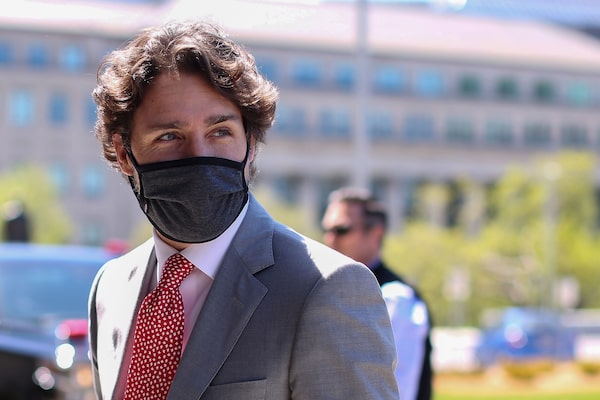
Canadian Prime Minister Justin Trudeau arrives on Parliament Hill to attend a sitting of the Special Committee on the COVID-19 Pandemic, May 20, 2020 in Ottawa, Canada. Trudeau’s non-decision regarding Huawei has become an increasing cause for concern as Canada’s allies lay their cards on the table.DAVE CHAN/AFP/Getty Images
There is nothing really mysterious about Prime Minister Justin Trudeau’s steadfast refusal to be rushed into a decision on whether to ban Chinese telecommunications giant Huawei from Canadian 5G networks as he awaits the recommendations of national security review.
It is not immediately clear that a middle power such as Canada has anything to gain by further antagonizing a rising superpower that is already under siege from more powerful voices than our own for its handling of the coronavirus pandemic and crackdown on Hong Kong, especially when the fate of at least two Canadians arbitrarily jailed by China could hang in the balance.
Yet, Mr. Trudeau’s non-decision regarding Huawei has become an increasing cause for concern as Canada’s allies lay their cards on the table. If Australia, which has much more to lose by angering China than us, is willing to ban Huawei, then why not us? What’s more, Australia announced its decision in 2018, giving its wireless industry ample time to plan accordingly.
Bell Canada and Telus, which have been pushing for approval of Huawei, separately announced this week they would use equipment from European suppliers in their next-generation wireless networks rather than wait any longer for word from Ottawa. Their move effectively amounted to making Mr. Trudeau’s decision for him, although the two companies indicated they could still use Huawei equipment in non-core parts of their 5G networks if Ottawa allows it.
We have by now become accustomed to Mr. Trudeau’s distaste for having to make unpleasant decisions. We witnessed his government’s months-long refusal to stake its ground regarding approvals for Teck Resources’ proposed oil sands mine, lest it offend anyone. Luckily for Mr. Trudeau, Teck concluded that the project was both a political and economic non-starter, and pulled the plug itself in February.
Mr. Trudeau also hid behind the pretext of an internal government review of the $15-billion contract to sell Canadian-built light armoured vehicles to Saudi Arabia to avoid taking a stand before the last election, before quietly lifting a moratorium on LAV export permits in April at the height of a pandemic that monopolized media and opposition attention.
What is so curious about Mr. Trudeau’s continued silence on Huawei is that the choice between allowing or not allowing the telecom behemoth to bid on Canadian 5G equipment contracts is obvious to anyone familiar with China’s broader ambitions as it competes head-to-head with the United States for global superpower status. There is no guarantee that Huawei, which is subject to Chinese intelligence laws, would not be forced to spy on behalf of its own government. Indeed, as the U.S.-China cold war accelerates, it is naïve to believe otherwise.
China’s embassy in Ottawa has already accused Canada of acting as an “accomplice” in U.S. President Donald Trump’s bid to “bring down Huawei and other Chinese high-tech companies” by refusing to halt extradition procedures against Meng Wanzhou. Ms. Meng, Huawei’s chief financial officer, faces charges of bank fraud in the United States related to the violation of U.S. sanctions against Iran. Canadians Michael Kovrig and Michael Spavor, who have been detained in China for 18 months on baseless suspicions, are being used as bargaining chips as China presses Mr. Trudeau to release Ms. Meng.
Still, the time has come for Mr. Trudeau to stand with Canada’s allies and ban Huawei – not because he fears upsetting a vindictive Mr. Trump if he does not, but because it is the right thing to do and because it will protect Canada’s interests in the long run. Canada does not have an intelligence service worthy of the name without U.S. cooperation. Maintaining our access to intelligence provided by our allies is critical to our national security, especially in the face of China’s increasing belligerence and bullying.
To be sure, Mr. Trudeau remains under the spell of the Canada China Business Council, which is led by Power Corporation of Canada, and is eager to avoid jeopardizing Canada’s access to the world’s biggest market. But the potential benefits of business with China could be overblown anyway, as a reordering of trade flows in the post-pandemic world will soon be upon us.
There remains a wide-eyed belief among some members of Mr. Trudeau’s cabinet that Canada can straddle the fences in its relations with Washington and Beijing, a belief partly informed by a particular strain of anti-Americanism that infects the federal Liberal Party.
Health Minister Patty Hajdu demonstrated that in April, when she accused a journalist who questioned the accuracy of China’s official COVID-19 case count of “feeding into conspiracy theories that many people have been perpetuating on the internet.” Her outburst was just plain sad coming from a senior minister. It made you wonder about what really gets said about China around the cabinet table.
Keep your Opinions sharp and informed. Get the Opinion newsletter. Sign up today.